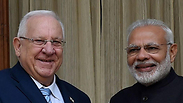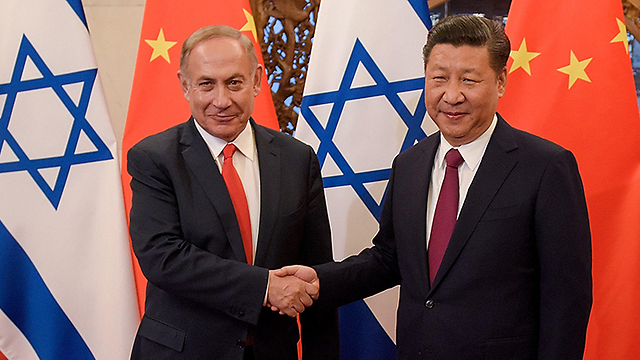
Israel’s allies during the 21st century
Op-ed: As American hegemony is challenged by China and as the costs and failures of foreign policy idealism in the Middle East mount, US voters will be more reluctant to support a muscular pro-Israel foreign policy. Nevertheless, there are a number of seldom-discussed trends that will benefit Israel.
American foreign policy has often been idealistic, as exemplified by the pushes for world peace and democratization made by Presidents Woodrow Wilson and George Bush Jr. However, as American hegemony in the 21st century is challenged by China and as the costs and failures of foreign policy idealism in the Middle East mount, American voters will be more reluctant to support a muscular pro-Israel foreign policy. This support could be fatally undermined if American public opinion starts to believe that Israel’s control of Palestinians is motivated by territorial expansionism rather than by security considerations.
The identification with the plight of the Jewish people symbolized by the Holocaust, was another key factor in making American public opinion support Israel in the post-World War II era. However, as memories of the Holocaust recede and as Jews continue to thrive in the US, it will be harder to argue that threats to the Jewish Diaspora legitimize support for Israel.

This factor will be aggravated by the steady secularization of the US. Surveys during recent decades suggest that younger Americans increasingly resemble Europeans in their religious views. Thus, the strong identification of mainstream Americans with Israel as the fulfillment of Biblical prophecy will weaken. This means that in a few decades from now, the ranks of Evangelical Christian supporters of Israel in the US will be thinned.
A more tepidly Christian electorate will be complemented by a Jewish-American community eroded by assimilation and intermarriage. As Israel becomes more religious, while Jewish identity abroad dilutes, a chasm between the Jewish Diaspora and Israel will be unavoidable. It is hard to foresee how this chasm can be filled in the 21st century.
Nevertheless, the outlook for Israel is bright. There are a number of seldom-discussed trends that will benefit Israel during the 21st century.
The global threat of Islamism will be a fundamental factor in shaping attitude towards Israel in coming decades. As American, European, Indian, African and Chinese non-Muslims feel increasingly threatened by Islamic jihadism, it is likely that support and sympathy for Israel on the world stage will strengthen. This phenomenon is increasingly clear as politicians as diverse as Donald Trump, Geert Wilders, Frauke Petry and Narendra Modi blend anti-Islamist rhetoric with vocal support for Israel.
Europe will be an especially interesting case-study for this phenomenon during the 21st century. Traditionally anti-Semitic Eastern European countries may become some of the strongest supporters of the Jewish State. As historical memories of Islamic aggression are revived by mass Islamic immigration to the European continent, Eastern Europeans will rediscover and cherish their historical ties to the Jewish people. In Western Europe, where Muslim communities will challenge the dominance of native Europeans, policies towards Israel will become increasingly erratic: Left-wing governments will be aggressively anti-Israeli in order to pander to Muslim voters, while right-wing governments will embrace Israel to corroborate their anti-Islamist and Judeo-Christian credentials.
Any analysis of Israel’s strategic situation in the 21st century must mention China. The superpower of the 21st century may well become a stalwart supporter of the Jewish state. Confucian reverence for industry, erudition and family bonds dovetails nicely with traditional Jewish values. Indeed, there is already a relatively strong interest in China for Jewish culture thanks to the shared meritocratic ethos of the two cultures. This interest could be catalyzed by the growing ranks of Christians in China. It is not implausible that the tens of millions of Christians in China during the 21st century will embrace the pro-Israel narrative that so far has been the reserve of Evangelical Christians in the United States.
Furthermore, as Islamist violence in China’s Xinjiang region festers and fuels tensions between Muslim Uyghurs and Han Chinese, it is likely that mainstream Chinese public opinion will instinctively support Israel against its hostile Muslim neighbors. This sympathy will translate into government policy when China democratizes and renewable energies wean the Chinese economy from its current dependency on Middle Eastern oil imports.
In this context, India is likely to become another reliable ally of Israel. Whereas the secularist Congress Party which dominated Indian politics until the early 1990s was hostile to Zionism, the proudly Hinduist BJP sympathizes with Israel’s challenges and has invested billions of dollars in purchasing Israeli military and civilian technology.
It is therefore essential that Israel’s establishment invest all available energies in strengthening cultural, economic and political bonds with China and India. Israel’s success during this century will depend on its ability to persuade the elites of the East that support for the presence of the Jewish People in the Land of Israel is a smart move.
An effective means to secure this goal would be to grant scholarships to the brightest Chinese and Indian students to study humanities and social sciences in Israel. Were this to happens, the Indian and Chinese journalists, diplomats and intellectuals of the 21st century may acquire a sympathy for Israel which would be denied to them if they continue to study in European and American universities.
The age of American dominance in world business and politics will end during the next decade. This development presents great challenges and opportunities. In order to seize the opportunities offered by the emerging powers of the East, Zionist activists need to hold their breath and layout long-term plans. Taming the four-year cycle of legislative and presidential elections in the US will no longer be relevant in the 21st century. Shaping the views of emerging elites and electorates in the ancient civilizations of China and India will be far more fundamental.










